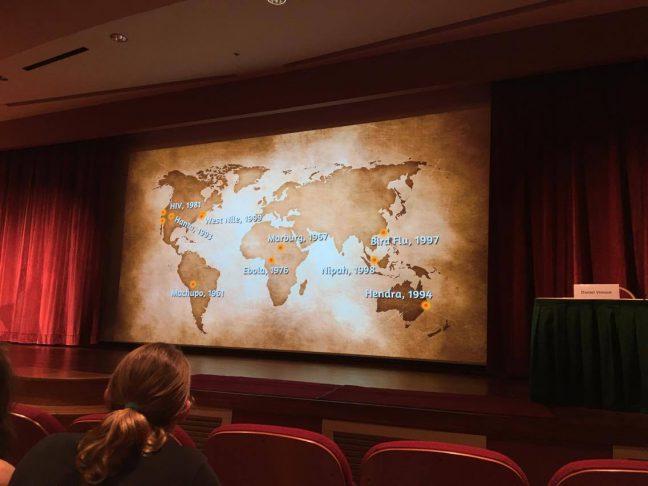In a talk about climate change, El Niño events and infectious disease, UW professors and a science journalist explored the relationship between increased temperature and outbreaks of diseases such as Dengue, Ebola and Zika.
At the University of Wisconsin Nelson Institute’s Earth Day Conference Monday, UW associate professor of atmospheric and oceanic sciences Daniel Vimont pointed out a strong correlation between El Niño events, which causes warm weather, and spikes in cases of Dengue, or yellow fever. The latest serious El Niño event, which was the strongest in recorded history, coincided with the largest Dengue outbreak to date in Brazil, he said.
This isn’t a coincidence, Vimont said. The correlation between warm weather events and infectious diseases is caused by their carrier: mosquitoes. The Aedes aegypti mosquito, commonly known as the yellow fever mosquito, carries the Zika virus as well as Dengue, he said.
Jonathan Patz, UW Global Health Institute director, said temperature is important in determining the infectiousness of mosquitoes.
This is because the extrinsic incubation period, or the development rate of the disease within the mosquito, shortens as temperature increases, Patz said. For example, at normal temperatures, it might take 20 days for the parasite to cross the stomach lining of the mosquito and develop into an infectious stage in the salivary gland, he said. But if temperature were to increase, that mosquito could be infectious in 14 or 15 days, he said.
Climate change and increasing international travel have also contributed to the outbreaks of viral disease, Patz said, pointing to West Nile Virus as an example.
The virus reached the U.S. due to international travel, and it entered the first state, New York, during the hottest July in recorded history, Patz said. This specific strain of the virus required warmer temperatures than other strains, allowing it to thrive during abnormally hot summers from 2002 to 2004, according to a study by William Reisen at the University of California-Davis.
“Every way that we disrupt or change environmental stability seems to have a backlash, and some of this has emerged in infectious diseases around the world,” Patz said. “So it’s not just climate change, it’s also global environmental change.”
These diseases are frightening not only because of their link to increased temperature and international travel, but the animals they come from, David Quammen, a science journalist and author of “Ebola, Zika and Beyond: Scary Viruses in a Globalized World, said.
Quammen said most of the scariest new diseases, and some old ones like the black plague, are zoonotic diseases, which are passed to humans from animals.
“They remind us of our connection to the natural world — the old Darwinian truth that we humans are animals,” he said. “We are not separate from the natural world.”
Quammen said spillover, which happens when a zoonotic pathogen crosses over into humans, can happen in a variety of ways. This could be killing or eating infected wildlife, or sweeping up dust contaminated with animal urine. Domesticated animals, however, are far less likely to pass on diseases to humans than wildlife, he said.
Unlike Zika and Dengue, the carrier of Ebola is still unknown, which has made it difficult to control, Quammen said. The spotlight of concern has moved on from the disease, but people are still being infected by it in Guinea and Liberia. Until the host is identified, no one will know how to contain the disease, he said.



















